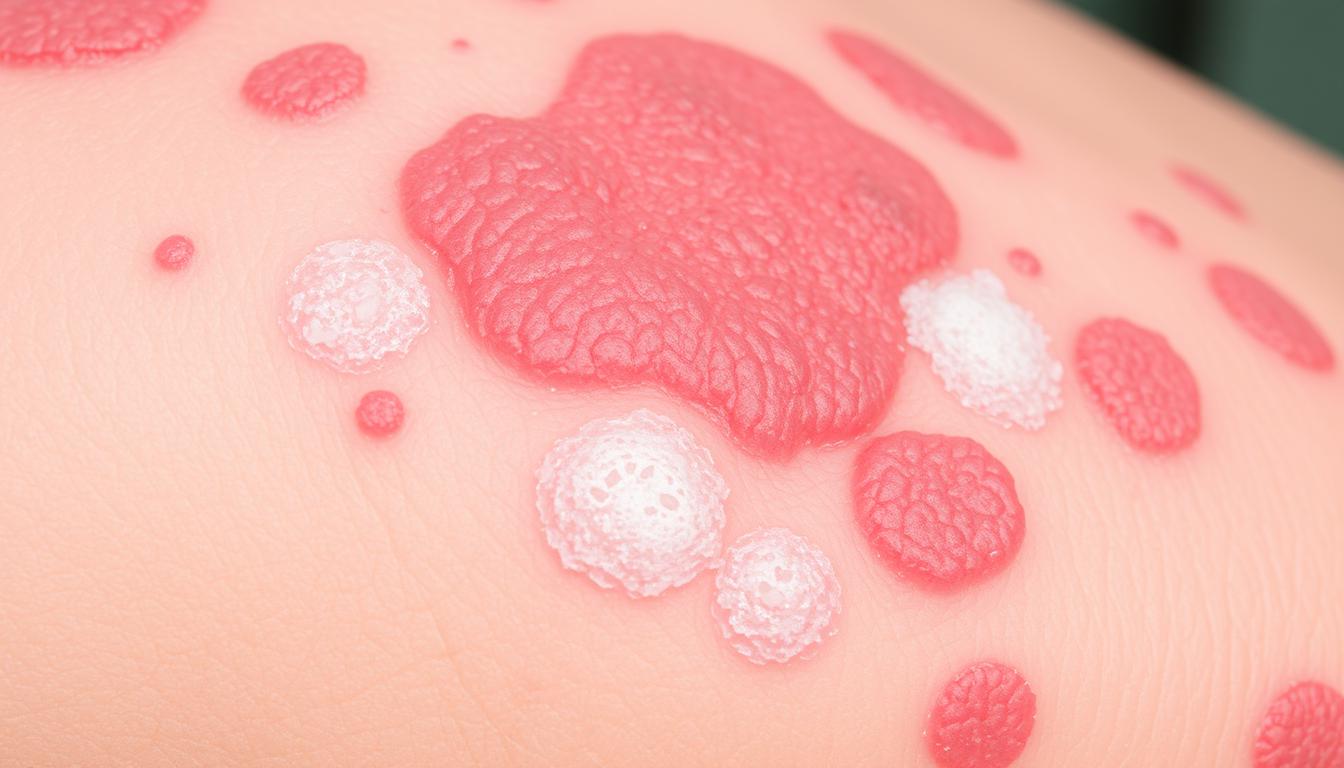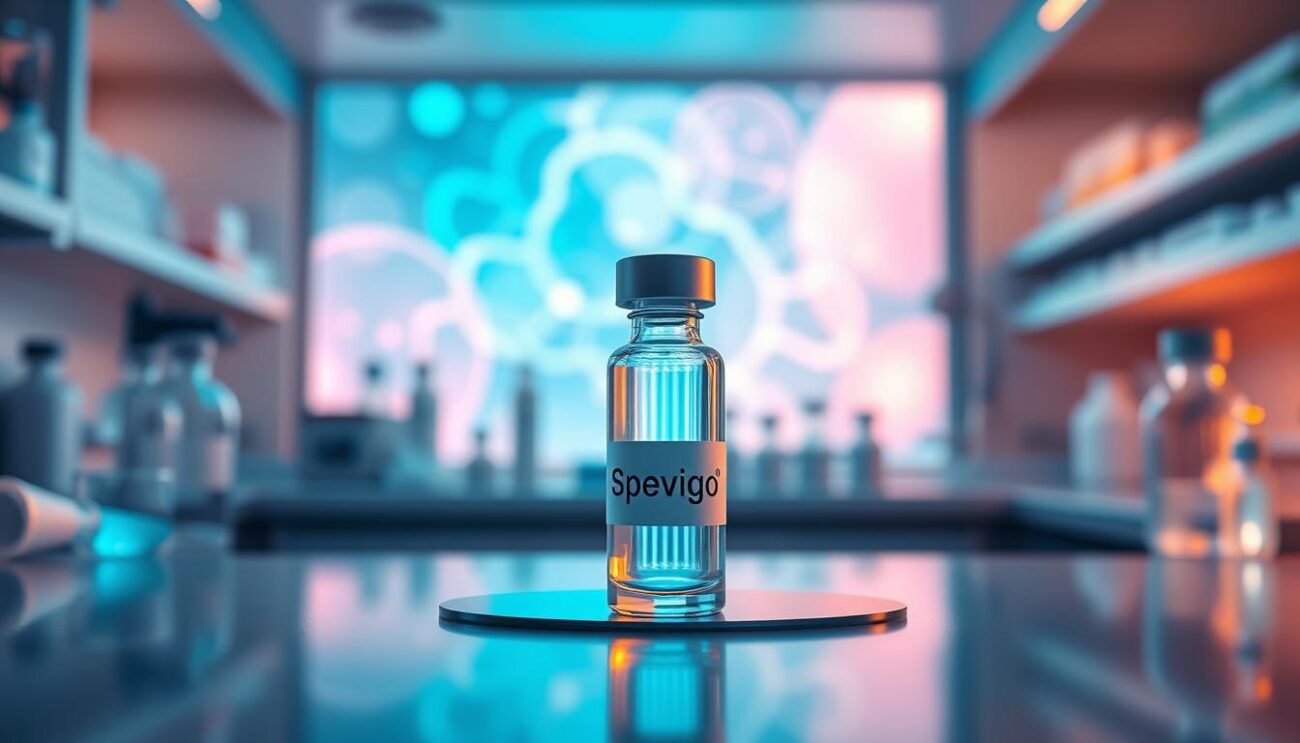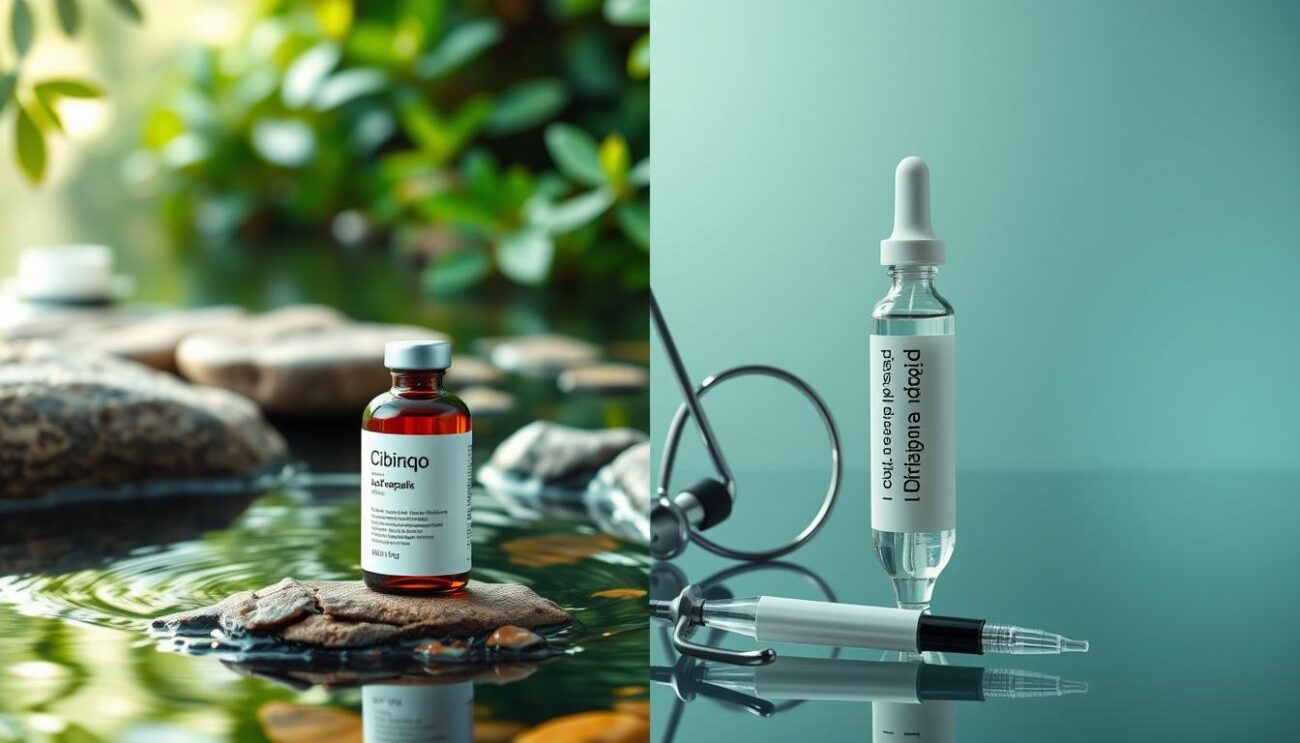Do you live with plaque psoriasis, affecting 500,000 to 1 million Canadians? This chronic condition brings red, scaly patches and pain. But, Ilumya (tildrakizumab-asmn) offers a new hope for managing it.
Key Takeaways
- Ilumya is a novel biologic therapy approved by the FDA in 2018 for the treatment of moderate-to-severe plaque psoriasis in adults.
- As an interleukin-23 (IL-23) antagonist, Ilumya offers a targeted approach to managing this inflammatory skin condition.
- Ilumya has shown efficacy in achieving clear or almost clear skin for individuals with moderate to severe plaque psoriasis.
- The recommended dosage for Ilumya includes an injection every 12 weeks after the initial two injections at 4-week intervals.
- Ilumya may cause mild side effects such as injection site reactions, diarrhea, and upper respiratory infections.
What is Ilumya?
Ilumya, also known as tildrakizumab, is a biologic medication approved by the FDA. It’s for adults with moderate-to-severe plaque psoriasis. As an IL-23 inhibitor, it blocks a protein called interleukin-23 (IL-23). This protein is key in the immune response that causes psoriasis symptoms.
Ilumya’s Mechanism of Action
Ilumya targets the IL-23 pathway. This helps reduce inflammation and skin lesions in plaque psoriasis. It’s a targeted therapy that manages the autoimmune processes behind psoriasis.
FDA Approval for Ilumya
Ilumya got U.S. approval from the FDA in March 2018. It’s for adults with moderate-to-severe plaque psoriasis who need systemic therapy or phototherapy. The dosage is 100 mg, given via subcutaneous injection at weeks 0, 4, and every 12 weeks after.
“Ilumya is a game-changing treatment option for people living with moderate-to-severe plaque psoriasis, offering a new way to manage this chronic, autoimmune condition.”
Moderate-to-Severe Plaque Psoriasis
Plaque psoriasis is a chronic autoimmune skin condition that affects over 80% of psoriasis cases. It is the most common form of the disease. This chronic inflammatory disease causes red, scaly patches to develop on the skin. These patches can cover large areas of the body in moderate-to-severe cases.
These lesions can significantly impact a patient’s quality of life. But, psoriasis is not contagious.
Treatments for moderate-to-severe plaque psoriasis aim to control symptoms and prevent flare-ups. They also aim to improve the appearance of the skin. ILUMYA (tildrakizumab-asmn), a biologic therapy approved by the FDA in 2018, has emerged as a promising option for managing this condition.
Approximately 125 million people worldwide are affected by plaque psoriasis. Over 7.5 million in the US alone are affected. The condition is characterized by the development of thick, red, and scaly patches on the skin.
These patches are often accompanied by itching, pain, and discomfort. Managing moderate-to-severe plaque psoriasis is crucial for improving the patient’s overall well-being and quality of life.
Ilumya: A Breakthrough Biologic Therapy
Ilumya, also known as tildrakizumab, is a big step forward in treating moderate-to-severe plaque psoriasis. It works as an IL-23 inhibitor. This means it blocks the IL-23 cytokine from interacting with its receptor. This action stops the immune system from getting too active and causing the skin problems seen in psoriasis.
How Ilumya Works
Ilumya is different from older treatments that weaken the whole immune system. It targets the IL-23 pathway specifically. This focused approach helps manage the immune system’s imbalance that leads to psoriasis. It results in clearer skin and better health for those with the condition.
| Biologic Therapy | Mechanism of Action | Targeted Pathway |
|---|---|---|
| Ilumya (tildrakizumab) | IL-23 inhibitor | IL-23 pathway |
| Secukinumab | IL-17A inhibitor | IL-17 pathway |
| Ustekinumab | IL-12/23 inhibitor | IL-12/23 pathway |
Ilumya’s focus on IL-23 inhibition makes it a more precise treatment for plaque psoriasis. This could lead to better results for patients in the long run.
“Ilumya represents a significant breakthrough in the treatment of moderate-to-severe plaque psoriasis, offering a more targeted and precise approach to managing this chronic, debilitating skin condition.”
Administration and Dosage of Ilumya
Ilumya is a new treatment for plaque psoriasis. It’s given as a subcutaneous injection. The dose is 100 mg, given at weeks 0, 4, and then every 12 weeks after.
Each syringe has 1 mL of 100 mg/mL tildrakizumab-asmn solution. It’s important to get this treatment from a healthcare professional.
Before starting Ilumya, patients need to check for tuberculosis. Ilumya was first approved in the U.S. in 2018. It’s a new and hopeful treatment for plaque psoriasis.
- The first dose of ilumya administration is 100 mg, followed by a second dose of 100 mg 4 weeks later.
- Maintenance dosing for ilumya dosage involves a 100 mg dose 12 weeks after the second dose, then every 12 weeks.
- Subcutaneous injection of Ilumya is done by a healthcare professional. The injection site is usually in the thigh, abdominal area, or upper arm.
- If a dose of Ilumya is missed, it should be rescheduled as soon as possible to resume the regular plaque psoriasis treatment dosing schedule.
Ilumya is a promising new treatment for patients with moderate-to-severe plaque psoriasis. Its easy dosing and subcutaneous administration make it appealing to both healthcare providers and patients.
Clinical Trials and Efficacy
Ilumya, a new biologic therapy, has shown great promise in treating plaque psoriasis. Over 1,800 patients took part in two major studies, P010 and P011. These studies showed Ilumya outperformed placebo in improving psoriasis symptoms.
Ilumya vs. Placebo
In the P010 and P011 trials, more Ilumya patients hit the main goal of a 75% reduction in psoriasis severity. This was at week 12. Specifically, 58% and 56% of Ilumya patients reached this milestone, compared to 7% and 11% on placebo.
More Ilumya patients also saw a significant improvement in their skin condition. A PGA score of “clear” or “minimal” with at least a two-grade reduction from baseline was achieved by 51% and 50% of Ilumya patients. This was a key secondary goal. In contrast, only 4% and 5% of placebo patients reached this level.
Ilumya vs. Other Biologics
Network meta-analyses suggest some IL-17 and IL-23 inhibitors might be slightly more effective than Ilumya. However, Ilumya shows comparable results to other FDA-approved treatments like adalimumab, certolizumab, and ustekinumab. Its targeted action, safety, and easy dosing make it a good choice for many patients.

“The robust clinical trial data for Ilumya reinforces its position as a valuable addition to the treatment armamentarium for patients with moderate-to-severe plaque psoriasis.”
Ilumya: A Potential Game-Changer
Ilumya is the third IL-23 inhibitor approved for plaque psoriasis in the US. It offers a new treatment option for those with moderate-to-severe disease. By targeting IL-23, Ilumya is more focused than older treatments.
Though direct comparisons are rare, Ilumya has shown great results in trials. It could be a good choice for those not helped by other biologics. A survey found over half of those with plaque psoriasis sometimes avoid social events because of their symptoms. This shows the need for effective treatments.
“Patients appreciate the dosing schedule of Ilumya as they only need to visit the office once every three months for their injection.”
Ilumya has a convenient dosing schedule. Patients only need to visit the office every three months for their injection. This is easier than the more frequent dosing of some other biologics.
Ilumya can weaken the immune system and increase infection risk. Common side effects include upper respiratory infections, injection site reactions, and diarrhea. Still, Ilumya seems to be a promising option for those with moderate-to-severe plaque psoriasis.
| Biologic Medication | Approved Indications |
|---|---|
| Cimzia® | Psoriasis, Psoriatic Arthritis, Rheumatoid Arthritis, Ankylosing Spondylitis, Crohn’s Disease |
| Cosentyx® | Plaque Psoriasis, Psoriatic Arthritis, Ankylosing Spondylitis |
| Enbrel® | Plaque Psoriasis, Psoriatic Arthritis, Rheumatoid Arthritis, Ankylosing Spondylitis, Juvenile Idiopathic Arthritis |
| Humira® | Plaque Psoriasis, Psoriatic Arthritis, Rheumatoid Arthritis, Ankylosing Spondylitis, Crohn’s Disease, Ulcerative Colitis, Hidradenitis Suppurativa, Uveitis |
| Ilumya™ | Plaque Psoriasis |
Safety and Side Effects of Ilumya
Ilumya is a treatment for moderate-to-severe plaque psoriasis. It’s important to know about ilumya safety and ilumya side effects.
In studies, common adverse reactions were upper respiratory infections, injection site reactions, and diarrhea. Serious infections were rare, affecting up to 0.3% of users. Some people also experienced angioedema and urticaria, which are hypersensitivity reactions.
Before starting Ilumya, check for tuberculosis. Avoid live vaccines because Ilumya can weaken your immune system. It’s like other biologic therapies for psoriasis in terms of safety. But, it’s key to watch for side effects and report them.
| Adverse Reaction | Incidence Rate |
|---|---|
| Upper Respiratory Infections | Reported in clinical trials |
| Injection Site Reactions | Reported in 3% of patients in clinical trials |
| Diarrhea | Reported in 2% of patients in clinical trials |
| Serious Infections | Occurred in ≤0.3% of Ilumya patients |
| Hypersensitivity Reactions | Cases of angioedema and urticaria reported |
Remember, safety and side effects of Ilumya can differ for everyone. Always talk to your doctor about the risks and benefits of the medication.
Cost and Accessibility of Ilumya
Ilumya, a biologic medication for plaque psoriasis, has a significant cost. The first year’s cost is about $24,675. After that, it’s around $21,385 each year. This makes Ilumya’s cost similar to other biologic psoriasis drugs.
How easy it is to get Ilumya can change based on who pays for it. The Canadian Agency for Drugs and Technologies in Health (CADTH) suggests public drug plans should cover it. But, it must be prescribed by a dermatologist and cost less than other biologics. This shows how key ilumya accessibility and biologic medication pricing are for public drug coverage.
| Medication | Annual Cost Range |
|---|---|
| Ilumya | $21,385 – $24,675 |
| Other Biologics for Psoriasis | $16,023 – $39,080 |
The ilumya cost and how easy it is to get can differ a lot. This depends on things like insurance, financial help, and drug plans. It’s smart for patients to talk to their doctors about these issues. This way, they can find the best and most affordable treatment.
“The availability of innovative treatments like Ilumya is crucial for addressing the significant burden of psoriasis, which affects between 500,000 and 1 million Canadians.”
Patient Perspectives on Ilumya
Patients who took Ilumya in trials saw big improvements in their quality of life. This new biologic therapy made their skin clearer and less thick. This change greatly improved their physical, emotional, and social health.
Many patients felt more confident and comfortable with their skin. Ilumya brings hope to those with moderate-to-severe plaque psoriasis.
Quality of Life Improvements
Dr. Omar Noor says Ilumya is very effective and safe for biologic therapy in treating plaque psoriasis. Noor stresses treating patients as a whole. He also mentions the emotional toll of psoriasis and sometimes refers patients to mental health experts.
Psoriasis can make people feel insecure and have low self-esteem. Some even think their rash is contagious to their kids or want to amputate their limbs.
| Key Statistics | Findings |
|---|---|
| Over 95% skin coverage | Patients had over 95% skin coverage from head to ankles, ears, and knees prior to treatment with Ilumya. |
| Dosing schedule | Ilumya treatment involves a dosing schedule where patients only need to come in a few times a year after receiving two starter doses, offering convenience for those with busy schedules. |
| Financial accessibility | Ilumya is covered under Medicare Part B, highlighting its financial accessibility for patients over the age of 65. |
Ilumya’s proven success, easy dosing, and cost help make it a great option for plaque psoriasis patients. It can greatly enhance their quality of life.
“The emotional impact of moderate-to-severe plaque psoriasis can result in feelings of insecurity, low self-esteem, and even extreme reactions such as patients thinking their rash is contagious to their children or requesting amputations.”
Conclusion
Ilumya is a new IL-23 inhibitor that marks a big step in treating moderate-to-severe plaque psoriasis. Studies show it works well in clearing skin and easing symptoms. It’s a targeted treatment for those needing systemic therapy or light treatments.
Ilumya seems safe, like other biologics for psoriasis. It’s a new hope for clearer skin and better life quality. Its targeted action and proven results make it a good choice for doctors and patients.
Ilumya’s arrival as an IL-23 inhibitor shows the field’s progress in treating psoriasis. It offers a fresh way to fight inflammation. This is a big step for those with this tough skin condition.





